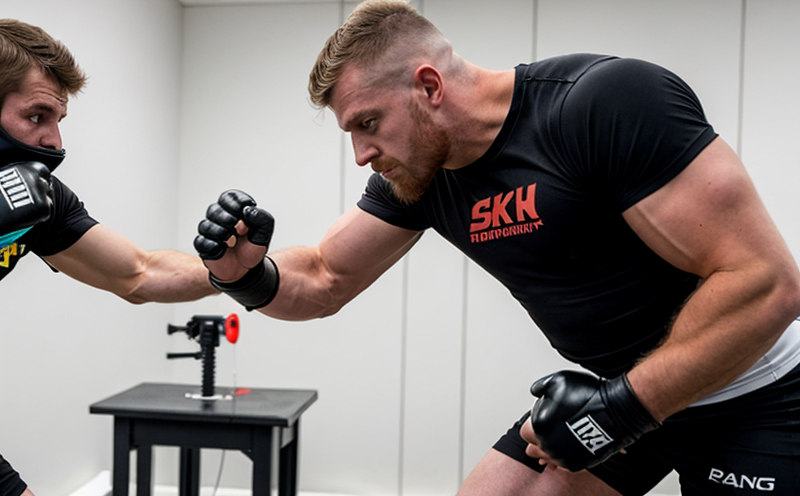BS EN 455-4 Protective Gloves Durability Testing
The BS EN 455-4 standard governs the durability testing of protective gloves, ensuring their resilience to various stressors and mechanical abrasions. This test is critical for industries where workers handle hazardous materials or perform tasks that could expose them to harmful substances. Compliance with this standard not only ensures worker safety but also protects organizations from potential legal risks.
The testing process involves subjecting samples of protective gloves to a series of repetitive mechanical abrasion cycles using the specified apparatus. The goal is to determine how well the glove material withstands these abrasive forces without compromising its integrity or reducing its protective capabilities. This durability test plays a pivotal role in validating that the gloves meet the required performance levels as defined by BS EN 455-4.
The abrasion testing machine, designed specifically for this purpose, applies controlled pressure and friction to simulate real-world conditions faced by workers in high-risk environments. The test can be conducted under different environmental conditions to assess how well a particular glove performs across various scenarios. Factors such as temperature, humidity, and the presence of corrosive chemicals are taken into account.
In addition to mechanical abrasion testing, other relevant tests include cut resistance, puncture resistance, and thermal stability assessments. These complementary tests provide a comprehensive evaluation of the gloves' overall protective performance. By incorporating these additional tests into your compliance strategy, you can ensure that your workers have access to the best protection available.
One key aspect of this testing is the importance of specimen preparation. Gloves used for testing must be pre-conditioned in accordance with the standards before undergoing abrasion cycles. This ensures that any variations due to manufacturing processes are minimized and only the true durability properties of the material are evaluated. Pre-conditioning also helps simulate real-world exposure, providing more accurate results.
The acceptance criteria for BS EN 455-4 are stringent and focus on maintaining the structural integrity and protective capabilities of the gloves throughout the testing process. Gloves that fail to meet these criteria may not pass the test, thereby ensuring they do not reach end-users in a compromised state.
Real-world applications of this testing extend beyond just compliance with standards. For instance, R&D engineers can use the results from BS EN 455-4 tests to refine their designs and improve glove materials for better performance. Additionally, quality managers and procurement officers benefit significantly by having reliable data that supports informed decision-making processes.
Compliance with this standard is essential not only within Europe but globally as it aligns with international best practices in occupational safety and health. By adhering to these stringent testing protocols, organizations demonstrate their commitment to worker well-being and operational excellence.
- Enhanced Safety: Ensures that workers are protected against potential hazards effectively.
- Compliance Assurance: Helps companies meet regulatory requirements and avoid penalties.
- Improved Design: Provides valuable insights for R&D teams to enhance product offerings.
- Risk Management: Allows organizations to manage risks associated with non-compliant protective gear.
Eurolab Advantages
At Eurolab, we pride ourselves on delivering comprehensive and accurate testing services tailored specifically for the occupational safety sector. Our state-of-the-art facilities equipped with advanced instruments ensure precise and reliable results every time.
Our team of highly skilled professionals ensures that each test is conducted meticulously following international standards such as BS EN 455-4. We offer flexibility in scheduling to accommodate your busy workloads, ensuring minimal disruption to your operations.
We understand the importance of confidentiality and data protection. Therefore, all sensitive information related to your tests remains strictly confidential. Our robust quality management systems are ISO/IEC 17025 accredited, guaranteeing that you receive consistent and accurate results.
Our extensive experience in this field allows us to provide expert advice and guidance on how best to comply with relevant regulations while enhancing overall safety standards within your organization.
Quality and Reliability Assurance
At Eurolab, we commit ourselves fully to maintaining the highest level of quality and reliability in all our services. Our robust quality management systems are ISO/IEC 17025 accredited, ensuring consistency and accuracy throughout every step of the testing process.
We employ only highly qualified personnel who undergo continuous training to stay updated on industry trends and advancements. This commitment to ongoing education ensures that our testers possess the necessary skills and knowledge required for accurate interpretations of results.
Our state-of-the-art laboratories are equipped with cutting-edge technology and equipment designed specifically for occupational safety testing. Regular calibration checks and maintenance guarantee optimal performance, delivering trustworthy outcomes time after time.
We invest heavily in research and development to stay ahead of emerging challenges in the field. By leveraging these resources, we ensure that our methods remain compliant with latest international standards like BS EN 455-4.





